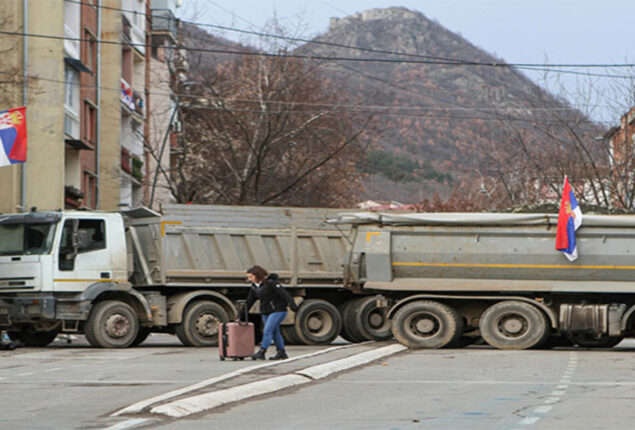Kosovo: Serbia puts army on high alert over rising tensions
The European Union has been making mediation efforts. Regarding the charges, the...

Serbs agrees to take down barricades after talks
Following the decision to dismantle the barricades obstructing the main border crossing, tensions between Serbia and Kosovo seem to have decreased.
In Kosovo, ethnic Serbs started placing the barricades on December 10 in opposition to the detention of a former police officer.
Following late-night negotiations between demonstrators and Serbia’s president, the decision to lift the roadblock was taken.
Aleksandar Vucic has cautioned that the Serbian minority in Kosovo still harbors a lot of suspicion.
The barricade at Merdare, Kosovo’s main border crossing with Serbia, has been removed, according to Kosovo police, and there are rumors that others have as well.
The removal of all the barricades, according to Mr. Vucic, might take days.
The action was taken shortly after the Serbian army declared that due to rising tensions with Pristina, it was at its “highest level of war preparedness.”
After a conflict in 1998–1999, Kosovo, which has a predominately ethnic Albanian population, seceded from Serbia.
Both Serbia and the ethnic Serbs that reside there reject Kosovo’s claim to independence.
Since Kosovo unilaterally declared its independence from Serbia in 2008, tensions between Belgrade and Pristina have fluctuated.
But in recent months, when ethnic Serbs withdrew all cooperation with Kosovo authorities, tensions have been at an all-time high.
Dispute over license plates served as the catalyst. Ethnic Serbs were required to give up the Serbian-issued license plates they had been using and switch to “Republic of Kosovo” plates, according to the Pristina authorities.
Though few people followed the directive before the deadline, Pristina’s intention to fine disobedient parties prompted a widespread resignation of ethnic Serbs from all of Kosovo’s state institutions in November.
More than 600 police officers of ethnic Serb descent turned surrendered their badges as part of this.
A political solution has not been reached despite efforts by the US, NATO, and the European Union to mediate the conflict. NATO has peacekeeping troops stationed in Kosovo.
The tensions then increased after a former police officer of ethnic Serb descent named Dejan Pantic was detained earlier this month on accusations of attacking the Kosovo force.
A Kosovo judge issued the release order for Mr. Pantic on Wednesday.
Serbia’s Prime Minister Ana Brnabic thanked Serbs in Kosovo on Thursday for “finding the strength to respond against barbaric violence and assault” in response to the decision to take down the barricades.
She said, nevertheless, that she didn’t believe that the “provocations” of Kosovo Prime Minister Albin Kurti would stop with the removal of the barricades.
The Pristina government has not made any formal comments regarding the lifting of the barriers.
Catch all the World News, Breaking News Event and Latest News Updates on The BOL News
Download The BOL News App to get the Daily News Update & Follow us on Google News.